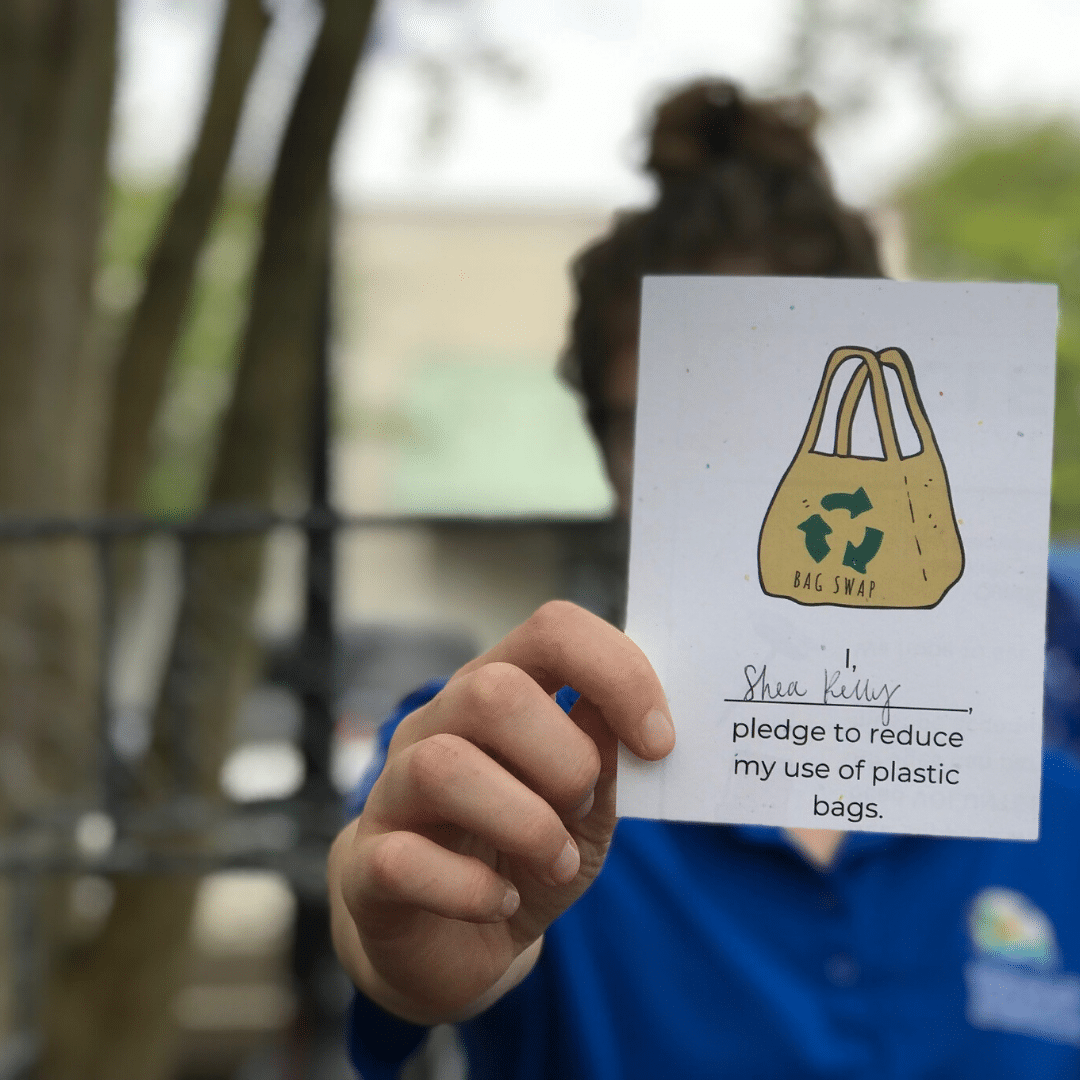Plastic bags. They are inconvenient to live without, but they cause more problems for our world than you might have considered. First up, they are a major contributor to climate change as their production and break down release harmful greenhouse gases. They commonly cause wildlife injuries as they can easily float from habitat to habitat, where they can be mistake for food or shelter. One of the most alarming byproducts, is how easily they can end up in our waterways as microplastics, breaking down smaller and smaller until they are invisible to the human eye. At the rate of current production, plastic in our oceans will outweigh fish by 2050. Not to mention that these microplastics end up in our drinking water, causing human health issues. If you’d like the full break down on why plastic is bad, come back to check us out in July, when we will be celebrating “Plastic Free July”! We’ll be posting an entire article dedicated to the harmful repercussions from these beloved items.

So, you know that you should stop using plastic bags, but like I said before, they are just so darn convenient! Well, there are some options for you to take. If you only have a few items in the store and you carried them up to the register without a bag, carry them out without one too!
If you have more than a few groceries, many think that using a paper bag is more eco-friendly than plastic. It is true that plastic can take up to 1,000 years to break down, while paper biodegrades in about 30 days. However, the manufacturing of paper bags can have just as many, if not more, negative effect than plastic bag production. The best alternative to both, is to bring a reusable bag. The average lifespan of bags that we receive from the store is 12 minutes. These bags also cost roughly 3-5 cents, the price of which is embedded in what you pay for your products. When these bags inevitably end up as litter, the government pays for some of it to be cleaned up, costing the taxpayer about $90 per year. So, while they may be more convenient than remembering to bring in your own bag, they are not free and entirely unnecessary. If you bring a bag from home, you can use it repeatedly, giving it a much longer lifespan. I typically use them until they break!
Now let’s say I’ve swayed you. You’re going to start using reusable bags from now on. That’s great! But what do you do with the giant bag full of bags sitting in your pantry? You recycle them of course! However, most MRF’s (Materials Recovery Facilities) in the United States are not equipped to handle these items when mixed in with all of our other recyclables, so do NOT put them in your curbside recycling bin.

If plastic bags wind up in these facilities, it can cause major issues. They will wrap themselves around the gears, causing the entire line to shut down temporarily to cut the bags out, creating inefficiencies and risk for employees. Don’t believe me? Check out this video of an MRF in Vancouver for proof. If they can’t go in the normal recycling bin, where do they go? Back to the store! Many places around Escambia County will take back your plastic bags and ship them off to be recycled, such as Publix, Lowes, Walmart, Winn Dixe, and Target. If you’re starting to overflow with the bags, you can also bring them to Keep Pensacola Beautiful! This July, we will be hosting “Bag Swaps” all around the county, where you can bring us your plastic bags and we will give you a reusable bag in exchange. From there, we will recycle them for you. If you’re curious about how this process works, check out this video brought to you from the largest plastic bag recycling facility in the world.

You’ve made the switch to reusable bags and you’ve recycled all your old plastic bags… what next? There’s one last thing you can do to contribute to the fight against one-time use bags. Let store owners and policy makers know that you want to see a change! So far, 8 states have banned the use of plastic bags, beginning with California in 2014.
California’s bill barely passed with a 52% vote in favor. The policy also requires citizens to pay at least 10 cents per reusable plastic bag, recycled paper bag, and compostable bags. While opinions were clearly divided, the transition was smooth, and they have seen a 72% drop in plastic bag usage. Some states bans are all inclusive as well, or only apply to certain places, usually grocery stores as they are the largest offenders. Maine was the first state to require stores that use plastic bags to have a convenient recycling receptable and method of collecting the contents. Vermont went so far as to also place a ban on single-use straws and polystrene containers as well, but that’ a whole other ball game for a different article!
To sum up, skip the bag if you only have a few items, switch to reusable bags for more items, recycle the plastic bags you already have, and vote for the changes you want to see in our state. If you’d like to learn more about plastics and recycling, Keep Pensacola Beautiful offers 45-minute presentations on just that! We come right to your office with lots of helpful resources on our local regulations. If that’s not enough, check out our entire Recycling @ Work program on our website!
Sources
Schultz, Jennifer. “State Plastic and Paper Bag Legislation.” National Conference of State Legislatures, 24 Jan. 2020, www.ncsl.org/research/environment-and-natural-resources/plastic-bag-legislation.aspx.
Doyne, Shannon. “Should Plastic Bags Be Banned Everywhere?” The New York Times, The New York Times, 2 Mar. 2020, www.nytimes.com/2020/03/02/learning/should-plastic-bags-be-banned-everywhere.html.
Greentumble. “How Are Plastic Bags Made?” Greentumble, 24 Oct. 2019, greentumble.com/how-are-plastic-bags-made/.
“Reasons to Ban Plastic Bags.” Green Acton, 13 Feb. 2019, greenacton.org/2018/02/13/reasons-to-ban-plastic-bags/.

